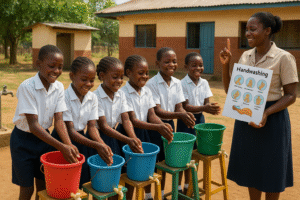Education is a powerful tool that can break the cycle of poverty and transform societies. However, in many rural areas of Nigeria, girls face significant barriers to accessing quality education. Cultural norms, economic hardships, early marriage, and inadequate school infrastructure continue to prevent many girls from receiving the education they deserve. Promoting girl child education in rural areas is essential for achieving gender equality and fostering national development.
Investing in girls’ education has far-reaching benefits, including:
- Economic Growth: Educated girls are more likely to secure better jobs, contribute to household income, and drive economic development.
- Improved Health Outcomes: Educated women are more aware of health practices, leading to lower maternal and child mortality rates.
- Reduction in Child Marriage and Gender-Based Violence: Girls who stay in school are less likely to be forced into early marriage or subjected to abuse.
- Empowerment and Social Change: Education equips girls with knowledge and confidence to advocate for their rights and participate in decision-making.
Despite the numerous benefits of educating girls, several barriers persist:
- Cultural and Religious Beliefs: In some communities, educating girls is not prioritized due to traditional gender roles and misconceptions.
- Poverty and Economic Constraints: Families struggling financially often prioritize boys’ education over girls’, expecting girls to contribute to household labor.
- Early Marriage and Teenage Pregnancy: Many girls are forced into marriage at a young age, cutting short their education and limiting future opportunities.
- Lack of School Infrastructure: Many rural areas lack proper school buildings, learning materials, and female-friendly facilities, making it difficult for girls to attend and remain in school.
- Long Distance to Schools: The absence of nearby schools forces many girls to walk long distances, increasing the risk of harassment and discouraging attendance.
- Limited Female Teachers and Role Models: The lack of female educators in rural schools affects girls’ motivation and access to mentorship.
To ensure more girls in rural Nigeria have access to education, the following steps should be taken:
- Community Awareness Programs: Educating parents and community leaders on the importance of girl child education to change societal perceptions.
- Providing Scholarships and Financial Assistance: Offering financial aid and scholarships to support girls from low-income families.
- Building Safe and Accessible Schools: Establishing more schools in rural areas with adequate facilities, including separate toilets for girls.
- Empowering Girls Through Skills Training: Integrating vocational training programs alongside formal education to equip girls with practical skills.
- Eliminating Gender-Based Violence in Schools: Enforcing policies to protect girls from harassment and discrimination in learning environments.
- Encouraging Female Teacher Recruitment: Increasing the number of female teachers to serve as mentors and role models for young girls.
Adewumi Foundation is committed to promoting education for girls in rural Nigeria by:
- Providing Scholarships and Learning Materials: Distributing educational resources to underprivileged girls.
- Advocating for Policy Reforms: Working with stakeholders to create policies that support girl child education.
- Organizing Mentorship and Empowerment Programs: Connecting young girls with role models who inspire and guide them.
- Improving School Infrastructure: Partnering with organizations to build safe and conducive learning environments for girls.
Education is a fundamental right that every girl deserves. By investing in girl child education, we can build a more equitable society where all children, regardless of gender, have the opportunity to reach their full potential.
Discover more from Adewumi Foundation
Subscribe to get the latest posts sent to your email.




